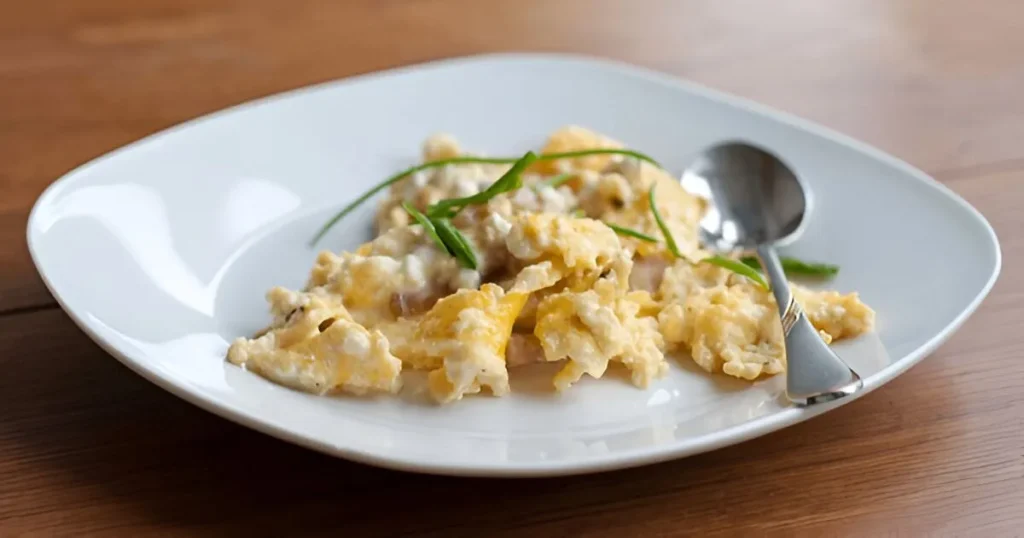Let’s be real — mornings are chaotic. Whether you’re juggling kids, workouts, or just the brutal reality of an early commute, breakfast often ends up rushed, skipped, or worse… replaced with sugar bombs in disguise. But what if you could whip up something warm, filling, and protein-packed in under 10 minutes?
Enter: cottage cheese eggs. Yep, it’s a combo that sounds odd until you try it — then suddenly you’re hooked. Creamy, savory, surprisingly fluffy, and ridiculously satisfying, this duo delivers serious nutrition without blowing your grocery budget.
This isn’t just a trendy TikTok hack or another “health food” trap that tastes like cardboard. Cottage cheese eggs actually work. They fuel your morning, help you stay full till lunch, and sneak in muscle-friendly protein without breaking a sweat. Ideal for anyone trying to eat clean, drop some weight, or just feel good heading into the day.
In this guide, you’ll get:
- A simple step-by-step recipe (no chef skills required)
- Clever add-ins and creative serving ideas
- Real answers to your “wait, can I actually do that with eggs?” questions
- Tips to nail the perfect creamy texture every single time
Whether you’re keto-curious, macro-counting, or just sick of oatmeal, this is your new breakfast go-to. Let’s crack some eggs and transform your morning routine.
Table of Contents

Ingredients for Cottage Cheese Eggs
Making delicious cottage cheese eggs starts with a handful of simple ingredients — no complicated shopping list or gourmet pantry needed. The real secret? Using high-quality basics and playing with optional extras to match your mood or macros.
Essential Ingredients
- 4 large eggs – The protein powerhouse and base of the dish
- ½ cup full-fat cottage cheese – Adds creaminess and slow-digesting protein
- 1 tbsp milk or cream (optional) – For an extra silky texture
- Salt and freshly cracked black pepper – For seasoning to taste
- 1 tsp butter or olive oil – Helps prevent sticking and adds flavor
Optional Add-Ins (Customize Your Breakfast)
- Fresh herbs – Chives, parsley, dill, or thyme
- Veggies – Diced bell peppers, onions, spinach, mushrooms
- Cheese – A sprinkle of cheddar, feta, or parmesan for more richness
- Spices – Smoked paprika, garlic powder, chili flakes, turmeric
Kitchen Tools You’ll Need
- Medium mixing bowl
- Whisk or fork
- Non-stick skillet or sauté pan
- Silicone or rubber spatula
With these ingredients and tools, you’re well on your way to mastering a quick, nourishing breakfast that can hold its own against any café plate.

How to Make Cottage Cheese Eggs Step-by-Step
Let’s walk through exactly how to make scrambled eggs with cottage cheese that come out creamy, fluffy, and satisfying — every single time.
Step-by-Step Cooking Process
- Crack and Whisk
Crack the eggs into a medium bowl. Add a pinch of salt and pepper. Whisk until yolks and whites are fully combined and the mixture looks slightly frothy. - Add the Cottage Cheese
Stir in the cottage cheese and (if using) the tablespoon of milk or cream. Mix until everything looks well blended, but don’t overbeat it. - Heat the Pan
Place a non-stick skillet over medium heat. Add the butter or olive oil and let it melt, coating the pan evenly. - Cook Low and Slow
Pour in your egg-cottage cheese mixture. Let it sit undisturbed for 15–30 seconds — this helps set the bottom. - Fold, Don’t Stir
Using a rubber spatula, gently fold the eggs from the edges toward the center. Don’t overwork it — this method keeps the curds soft and the texture rich. - Remove from Heat Just Before Done
Eggs continue to cook from residual heat. Once they’re about 90% set (still glossy and slightly loose), take the pan off the stove. Let them finish with carryover heat. - Serve Immediately
Spoon onto a plate, add your favorite toppings, and enjoy hot.
Tips for Perfect Cottage Cheese Eggs
Even a simple recipe like this has a few tricks that separate the good from the unforgettable. If you’ve ever ended up with rubbery eggs or watery curds, these practical tips can help you get creamy, cloud-like perfection every time.
Master the Texture
- Use full-fat cottage cheese: It melts better, stays creamy, and doesn’t leak liquid like low-fat versions.
- Go low and slow: Rushing on high heat toughens eggs. Medium-low heat lets everything cook gently and evenly.
- Stop early: Pull the pan off the heat before the eggs look completely done. They’ll keep cooking from residual heat (aka: carryover cooking).
- Whisk with intention: You don’t need to beat the life out of them, but make sure yolks and whites are fully integrated for even cooking.
Avoid These Common Mistakes
- Over-mixing cottage cheese into hot eggs: Add it before cooking or at the very end — otherwise it might separate.
- Over-seasoning early: Salt can pull water from the curds and make your eggs soggy. Add salt just before or during cooking, not too far in advance.
- Cooking in a dry pan: Butter or oil helps control heat and adds flavor. Don’t skip the fat.

Variations & Substitutions: Customize Your Cottage Cheese Eggs
What makes cottage cheese eggs so special — beyond the creamy texture and protein hit — is how endlessly flexible they are. You can dress them up, strip them down, or spin them into something entirely new depending on what’s in your fridge or on your mind.
Easy Swaps & Add-Ins
- Low-fat cottage cheese – Works fine, but you may want to drain off excess liquid before cooking.
- Egg whites only – For a lower-cholesterol option, use 6 egg whites and a pinch of turmeric for color.
- Dairy-free version – Swap in almond-based or soy cottage cheese (yes, they exist!) and use olive oil instead of butter.
Creative Serving Ideas
- Cottage Cheese Egg Muffins: Pour the mixture into a greased muffin tin, bake at 350°F (180°C) for 15–18 minutes. Great for meal prep!
- Cottage Cheese Breakfast Bowl: Serve scrambled eggs over a scoop of seasoned cottage cheese with avocado, cherry tomatoes, and spinach.
- Breakfast Wrap: Roll your scramble into a warm tortilla with salsa, beans, or sautéed greens for a hearty grab-and-go meal.
- On Toast: Spoon over whole-grain or sourdough bread and top with smoked paprika or everything bagel seasoning.
Unexpected Combos (That Actually Work)
- Cottage cheese + eggs + pesto
- Scrambled eggs with cottage cheese + kimchi
- Topped with roasted sweet potato cubes and goat cheese
Conclusion
Cottage cheese eggs are a great choice for breakfast. They are packed with protein and offer many benefits. They help with weight management and are easy on your wallet.
By following our guide, you can add cottage cheese eggs to your diet. They make for a tasty and protein-rich start to your day. Try different ways to make them and enjoy a variety of flavors.
Starting your day with cottage cheese eggs is a smart choice. It’s a key part of a healthy diet. It gives you the energy and nutrients you need to tackle the day.

cottage cheese eggs
Ingredients
- 4 large eggs
- ½ cup full-fat cottage cheese
- 1 tbsp milk or cream optional, for extra fluff
- Salt and black pepper to taste
- 1 tsp butter or olive oil for the pan
Optional Add-ins:
- Chopped chives or parsley
- Diced tomatoes or sautéed spinach
- A pinch of chili flakes or smoked paprika
Instructions
- Crack the eggs into a mixing bowl. Whisk until well blended.
- Stir in cottage cheese, milk or cream (if using), salt, and pepper.
- Heat butter or oil in a non-stick skillet over medium heat.
- Pour in the egg mixture. Let it sit undisturbed for 20–30 seconds.
- Stir gently with a spatula, folding the eggs slowly to form soft curds.
- Cook until just set — remove from heat slightly before they look done (carryover heat finishes the job).
- Serve warm, topped with herbs or extra cottage cheese if you like.
Frequently Asked Questions About Cottage Cheese Eggs
Can you really mix cottage cheese and eggs?
Yes, and it’s more common than you’d think. The proteins in both ingredients complement each other well, and the texture becomes surprisingly creamy and satisfying when cooked together. It’s not just “okay” — it’s a bit of a breakfast cheat code.
What’s the best type of cottage cheese to use?
Full-fat, small curd cottage cheese is ideal. It melts better into the eggs and gives a creamier texture. Large curds can work too, but they tend to stay more visible and can make the final dish chunkier.
Do I need to drain the cottage cheese?
Only if it’s very watery. A quick stir and a glance should tell you. If there’s a lot of liquid pooling, you can drain it slightly using a fine mesh sieve or cheesecloth — but most store-bought full-fat varieties don’t need draining.
Can I prep these ahead of time?
Sort of. You can whisk the eggs and mix them with cottage cheese the night before, but don’t cook them until you’re ready to eat. Cooked scrambled eggs don’t reheat well — they lose texture and moisture fast.
Is this dish good for weight loss?
Yes — especially if you’re focusing on high-protein, low-carb meals. Cottage cheese and eggs are both high in protein, which helps keep you full and reduces cravings later in the day.

